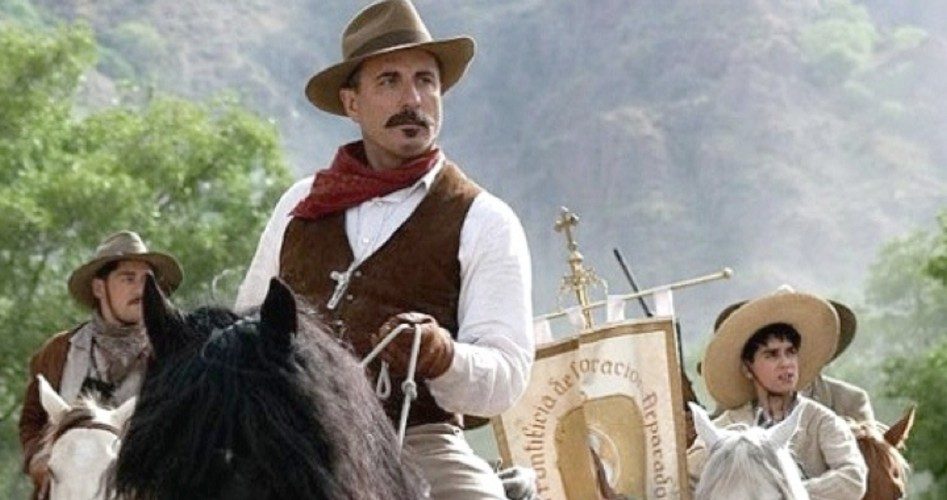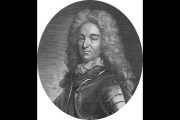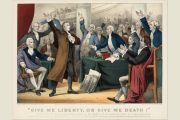
“¡Viva Cristo Rey!” (“Long Live Christ the King.”) That was the rallying cry for millions of Mexicans during the second and third decades of the 20th century, as revolutionary governments, modeled after the Bolshevik regime in Russia, unleashed round after round of persecution and terror throughout Mexico. For Greater Glory, the newly released epic film starring Andy Garcia and Eva Longoria, provides a stirring introduction to the “Cristero War,” or “Cristiada” (1926-1929), a heroic chapter of Mexico’s history that, until now, has been almost virtually unknown in the United States (as well as in Mexico, where the government has suppressed true reports of the persecutions and all favorable mention of the Cristeros, who finally rose up to fight for religious liberty).
The wholesale raping, pillaging, destruction and desecration of churches, torture and murder of Catholic priests, closing of Catholic schools, the takeover of education by anti-Christian propagandists, and other outrages initiated by the regime of President Plutarco Elias Calles, ultimately drove the long-suffering Mexican people to take up arms against the dictatorial oppressor. Tens of thousands — mostly peasants — joined the Cristero army, led by Gen. Enrique Gorostieta (played by Andy Garcia in the movie). Although poorly armed and usually outnumbered, the Cristeros repeatedly inflicted decisive defeats upon Calles’ army. Unable to defeat the Cristeros militarily, Calles resorted to diplomatic treachery, suing for peace and promising to restore religious liberty. Hundreds of Cristero leaders who accepted his amnesty and laid down their arms were tortured and executed; thousands of Cristero supporters were hunted down and murdered. It is to America’s everlasting shame that our White House and State Department not only aided Calles in this deception but also provided him with arms and airplanes, while blocking all attempts by the Cristeros — Christian freedom fighters — to buy arms and munitions. In so doing, the U.S. government aligned itself with the anti-Christian forces that have been initiating communistic revolutions throughout the world since that great atheistic prototype, the French Revolution of 1789.
Although Mexico is overwhelmingly Catholic (and was even more so at the beginning of the 20th century), the Mexican Constitution of 1917 reflected the Marxist and anti-clerical zeitgeist of the Bolshevik Revolution of that same year. In addition to confiscating all property (churches, schools, universities, hospitals, monasteries, convents, rectories, etc.) of the Catholic Church, the new Constitution placed draconian restrictions on Catholic worship and Catholic clergy, forbidding priests, bishops, and nuns even to wear their religious garb in public, on pain of fine and imprisonment.
For Plutarco Calles, the anti-clerical provisions of the revolutionary constitution were insufficient; he illegally added his own more brutal measures to augment it. Although For Greater Glory does portray on film some of the cruel reality and barbarism of Calles’ attack on Mexico’s Catholics, it understates the depravity and the viciousness of his pitiless campaign.
Under Calles, Mexico became the first country in the world to recognize the new Soviet Union, and the Soviet embassy that was established in Mexico City grew to be one of Moscow’s largest in the world and a key center for NKVD/KGB subversion, espionage, and terrorism throughout the Americas. However, even before Calles came to power in 1924, the new Communist regime in Moscow had begun exercising its influence in Mexico. Soviet dictator Lenin sent top Comintern (Communist International) agent Mikhail Borodin to Mexico in 1919 to coordinate a growing Communist-Socialist movement that was heavily larded with foreign elements, mostly American and European intellectuals. Among the agents Borodin recruited there was Manabendra Nath Roy (more commonly known as M. N. Roy) of India, who had studied at Stanford University before coming to Mexico, where he was a founder and first secretary-general of Socialist Party of Mexico. Under Borodin’s tutelage, Roy became a Comintern delegate and a founder of the Communist Parties of Mexico and India.
The Kremlin next sent Comintern agent and feminist revolutionary Alexandra Kollontai as ambassador to Mexico, though her real job was to prepare Mexico for its role (as perceived by Moscow) in the world revolution. As was frequently the case in other countries as well, Mexico’s native revolutionists didn’t always want to take orders from Moscow, even though they were muy sympatico with the political, social, and economic programs of the Soviet Union.
One of the key features of Russian Bolshevism that found its counterpart among the Mexican communists/socialists was a fanatical hatred for Christianity. Foremost among the atheist fanatics was the infamous infidel Tomas Garrido Canabal, Governor of Tobasco, whom Calles brought into his Cabinet. Canabal (called “Cannibal” by his critics) deported or killed virtually all of the Catholic priests in his province. The few whom he allowed to remain, he forced to marry. Canabal named one of his sons “Lenin,” in honor of the Soviet dictator. He named his murderous enforcers “Las Camisas Rojas” (“The Red Shirts’), who adopted “The Internationale,” the anthem of communists worldwide, as their own anthem.
One of Canabal’s nephews, a member of his Red Shirts, was named Lucifer. Canabal himself took delight in publicly burlesquing Christianity at every opportunity, and at one livestock exhibition christened a donkey “Christ,” a bull “God,” a cow “The Virgin of Guadalupe,” and an ox “The Pope.” Canabal delighted in festivals featuring the burning of crucifixes, crosses, religious statues and paintings, vestments, Bibles, and the libraries of Catholic schools and libraries. His thugs desecrated cemeteries, destroying all crosses and tombstones with angels, religious symbols, or Scriptural passages. As in Russia, all cities, villages, streets, and buildings with Christian names were given new, revolutionary names. One of Canabal’s top officials and his representative for Tobasco to the National Convention of 1933, was Arnulfo Perez, who styled himself “The Personal Enemy of God.” Perez told the Convention:
Yes, gentlemen, the Revolution has the imperative duty of combating the false divinity that is venerated in every temple and that has many altars in the hearts of the people. We must fight this outdated and absurd belief, inspired only by the fear and ignorance of humanity. We must fight ‘God,’ the maximum myth from which the greatest lies have been derived to exploit humanity and keep it on its knees throughout the centuries. “God” does not exist.
For militant atheists such as Calles, Canabal, and Perez, anti-Christian propaganda was an essential and integral part of their concept of “scientific” and “socialistic” education.
Calles illegally “amended” the Constitution in 1933 so that Article 3 read:
The education imparted by the State shall be a socialistic one and, in addition to excluding all religious doctrine, shall combat fanaticism and prejudice by organizing its instruction and activities in a way that shall permit the creation in youth of an exact and rational concept of the Universe and social life.
President Calles himself confirmed the worst fears and accusations of Mexican parents, teachers, and pastors: that his revolutionary, socialist government aimed at collectivization and brainwashing of the children, purging them of the “taint” of religion, tradition, parents, and family. In his address to the people of Guadalajara on July 20, 1934, Calles declared:
The Revolution has not ended… It is necessary that we enter a new period, the psychological period, of the Revolution. We must now enter and take possession of the consciences of the children, of the consciences of the young, because they do belong and should belong to the Revolution…. I refer to education, I refer to the school… because the children and youth belong to the community; they belong to the collectivity, and it is the Revolution that has the inescapable duty to take possession of consciences, to drive out prejudices and to form a new soul of the nation.
Typical of the oaths required of teachers under the Calles regime’s “socialistic education” is this pledge that teachers in the State of Yucatan were forced to sign:
I, _____, before the Federal Board of Education, solemnly declare, without any reservation whatsoever, to accept the program of the Socialist School and to be its propagandist and defender; I declare myself an atheist, an irreconcilable enemy of the Roman, Apostolic, Catholic religion, and that I will exert my efforts to destroy it, releasing the conscience from every religious worship and to be ready to fight against the clergy in whatever field it may be necessary….
The Continuing Revolution
Mexico has not completely repudiated its Bolshevik legacy. Although the anti-clerical extremes of the Calles regime have been attenuated or repealed, Article 24 of the Constitution, prohibiting prayer and the teaching of religion in schools, remains in place and has become a political hot issue in this election year. Most of the politicians of the ruling Partido de Alianza Nacional (PAN), including President Felipe Calderon, favor repeal of the religious prohibition. The party of Calles, the Partido Revolucionario Institucional (PRI), which ruled Mexico for 70 years, is split on the issue. Meanwhile the far-left Partido de la Revolución Democrática (PRD), an off-shoot of the PRI, not only adamantly clings to the anti-Christian constitutional provision, but has moved aggressively to implement policies favoring abortion and homosexual marriage in a way that would warm the revolutionary hearts of Comrades Calles, Canabal, Borodin, and Kollontai. After narrowly losing the 2006 presidential election to Calderon by less than one percent, PRD candidate Andres Lopez Obrador used his party’s control of Mexico City to pass one of the world’s most liberal homosexual marriage laws and a law legalizing virtually all abortions through the 12th week of pregnancy, for the nation’s capital, the huge Federal District. Obrador is again running for the presidency and again faces a tight race, although this time it appears his closest opponent is left-liberal PRI candidate Governor Enrique Pena Nieto, who holds a slight lead in some polls.
During his trip to Mexico in March of this year, Pope Benedict XVI delivered outspoken support to the efforts of Mexico’s Catholic Bishops and Catholic laity to repeal the anti-Christian legacy of the Calles regime. Will the papal exhortations and the renewed interest and fervor stirred by the Cristiada film, For Greater Glory, be enough to overturn the nearly century-long oppression of religious liberty endured by our neighbor to the South? That remains to be seen. Some political analysts discount any impact of Article 24 on the election, which is likely to be greatly overshadowed by two other issues: the economy and the ongoing violence of the drug wars. In a close race, however, it could affect the ultimate outcome.
Related articles:
“For Greater Glory” Portrays the Cristeros’ Fight for Religious Freedom




